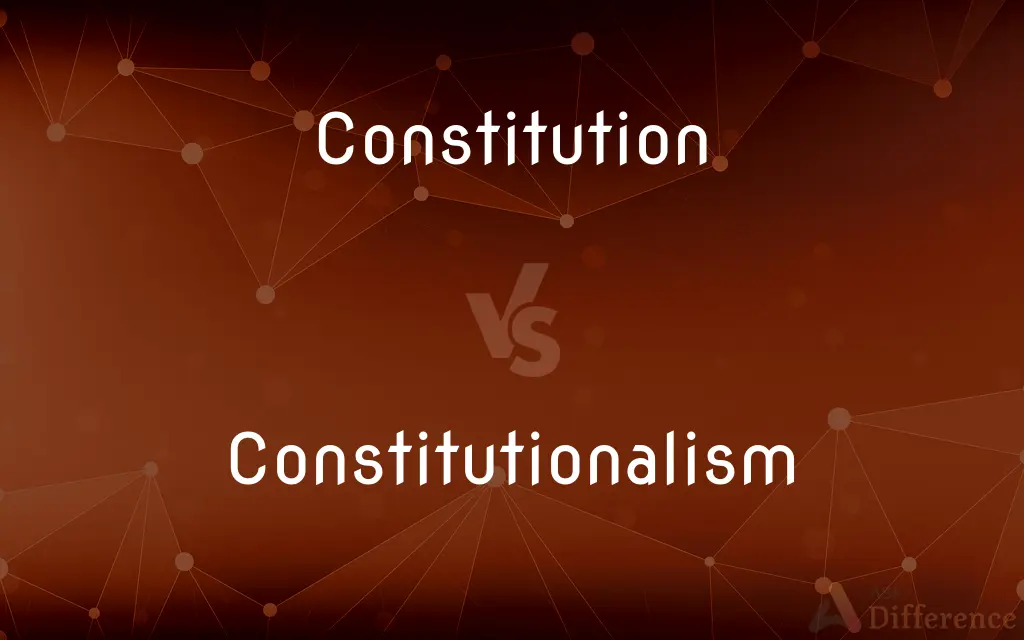Constitution vs. Constitutionalism — What's the Difference?
By Urooj Arif & Maham Liaqat — Updated on March 26, 2024
A Constitution is a set of fundamental principles or established precedents according to which a state is governed, while Constitutionalism is the political philosophy that institutions of a government should be guided by a constitution.

Difference Between Constitution and Constitutionalism
Table of Contents
ADVERTISEMENT
Key Differences
A Constitution refers to a written or unwritten document that outlines the system of fundamental laws and principles governing a country, state, or organization. It sets the framework for the rights and duties of institutions and individuals, detailing the structure of government, the distribution of power, and the rights of citizens. Constitutions are concrete documents or sets of laws that provide the legal foundation for a state's governance. On the other hand, Constitutionalism is an ideology or doctrine that emphasizes the importance of a constitution in limiting government power and protecting individual rights. It advocates for the rule of law, checks and balances, and the separation of powers to ensure that government operates within established legal frameworks and respects citizens' freedoms and rights.
While a Constitution is a tangible entity that can be referred to, amended, and interpreted, Constitutionalism is an abstract concept reflecting the principles and values that underpin the belief in a governed society according to a set of predefined rules. For example, the United States Constitution is a specific document that establishes the country's legal framework, whereas constitutionalism in the United States encompasses the broader belief system that values the enforcement of this document and the principles it represents, including democracy, the rule of law, and the protection of individual liberties.
Constitutions often arise from the ideals of Constitutionalism. The process of drafting, adopting, and amending a constitution is influenced by the philosophical beliefs about governance, sovereignty, and rights that Constitutionalism encompasses. In this sense, Constitutionalism can be seen as the driving force behind the creation and continuous improvement of constitutions, guiding how they are interpreted and applied over time to reflect society's evolving values and norms.
Constitutionalism plays a crucial role in shaping the legal and political culture of a nation. It ensures that not just the government, but also the citizens, understand and value the principles of limited government, the rule of law, and the rights and duties outlined in the constitution. This ideology supports the notion that a constitution is not merely a document but a living instrument that must be actively upheld and respected by all societal actors to maintain a just and democratic society.
While a Constitution provides the specific laws and principles that govern a state, Constitutionalism represents the overarching philosophy that promotes the idea of limited government and the protection of individual rights through adherence to a constitution. The relationship between the two is symbiotic, with Constitutionalism guiding the creation, interpretation, and enforcement of the Constitution to ensure that governance remains just, effective, and reflective of democratic values.
ADVERTISEMENT
Comparison Chart
Nature
Document or set of laws
Political philosophy or ideology
Focus
Establishing governance structure and legal framework
Advocating for governance according to constitutional principles
Function
Provides legal foundation for a state
Promotes principles of limited government and rule of law
Role in Governance
Directly governs by outlining laws and rights
Guides the application and interpretation of the constitution
Importance
Serves as the supreme law of the land
Ensures the constitution's principles are upheld and respected
Compare with Definitions
Constitution
Serves as the supreme legal document.
Laws and policies must comply with the Constitution to be valid.
Constitutionalism
Advocates for the protection of individual rights against government overreach.
Constitutionalism argues for the enforcement of constitutional rights for all citizens.
Constitution
Can be amended to adapt to societal changes.
The Constitution has been amended to extend voting rights and ensure civil liberties.
Constitutionalism
The principle that government should be based on a constitution.
Constitutionalism advocates for laws to be made within the framework of the Constitution.
Constitution
Outlines the structure of government and distribution of powers.
The Constitution divides government into executive, legislative, and judicial branches.
Constitutionalism
Supports a living constitution that evolves with society.
Constitutionalism promotes the interpretation of the Constitution in light of current values and norms.
Constitution
Enumerates the rights and freedoms of citizens.
Freedom of speech and religion are protected by the Constitution.
Constitutionalism
Emphasizes the importance of limiting government powers.
Constitutionalism supports checks and balances to prevent abuse of power.
Constitution
The fundamental laws and principles that govern a nation.
The U.S. Constitution establishes the country's legal and governmental framework.
Constitutionalism
Ensures that everyone, including government officials, is subject to the law.
Under constitutionalism, no one is above the law, ensuring accountability.
Constitution
A constitution is an aggregate of fundamental principles or established precedents that constitute the legal basis of a polity, organisation or other type of entity and commonly determine how that entity is to be governed.When these principles are written down into a single document or set of legal documents, those documents may be said to embody a written constitution; if they are encompassed in a single comprehensive document, it is said to embody a codified constitution. The Constitution of the United Kingdom is a notable example of an uncodified constitution; it is instead written in numerous fundamental Acts of a legislature, court cases or treaties.Constitutions concern different levels of organizations, from sovereign countries to companies and unincorporated associations.
Constitutionalism
Constitutionalism is "a compound of ideas, attitudes, and patterns of behavior elaborating the principle that the authority of government derives from and is limited by a body of fundamental law".Political organizations are constitutional to the extent that they "contain institutionalized mechanisms of power control for the protection of the interests and liberties of the citizenry, including those that may be in the minority". As described by political scientist and constitutional scholar David Fellman: Constitutionalism is descriptive of a complicated concept, deeply embedded in historical experience, which subjects the officials who exercise governmental powers to the limitations of a higher law.
Constitution
The act or process of composing, setting up, or establishing.
Constitutionalism
Government in which power is distributed and limited by a system of laws that the rulers must obey.
Constitution
The composition or structure of something; makeup.
Constitutionalism
A constitutional system of government.
Constitution
The physical makeup of a person
Having a strong constitution, she had no trouble climbing the mountain.
Constitutionalism
Advocacy of such a system.
Constitution
The system of fundamental laws and principles that prescribes the nature, functions, and limits of a government or another institution.
Constitutionalism
A constitutional system of governance.
Constitution
The document in which such a system is recorded.
Constitutionalism
Adherence to constitutional principles.
Constitution
Constitution The supreme law of the United States, consisting of the document ratified by the original thirteen states (1787-1790) and subsequent amendments.
Constitutionalism
Philosophical belief in government under a written constitution.
Constitution
The act, or process of setting something up, or establishing something; the composition or structure of such a thing; its makeup.
Constitutionalism
The theory, principles, or authority of constitutional government; attachment or adherence to a constitution or constitutional government.
Constitution
(government) The formal or informal system of primary principles and laws that regulates a government or other institutions.
Constitutionalism
A constitutional system of government (usually with a written constitution)
Constitution
(law) A legal document describing such a formal system.
Constitutionalism
Advocacy of a system of government according to constitutional principles
Constitution
(Catholicism) A document issued by a religious authority serving to promulgate some particular church laws or doctrines.
Constitution
A person's physical makeup or temperament, especially in respect of robustness.
He has a strong constitution, so he should make a quick recovery from the illness.
Constitution
(dated) The general health of a person.
Constitution
The act or process of constituting; the action of enacting, establishing, or appointing; enactment; establishment; formation.
Constitution
The state of being; that form of being, or structure and connection of parts, which constitutes and characterizes a system or body; natural condition; structure; texture; conformation.
The physical constitution of the sun.
Constitution
The aggregate of all one's inherited physical qualities; the aggregate of the vital powers of an individual, with reference to ability to endure hardship, resist disease, etc.; as, a robust constitution.
Our constitutions have never been enfeebled by the vices or luxuries of the old world.
Constitution
The aggregate of mental qualities; temperament.
He defended himself with . . . less passion than was expected from his constitution.
Constitution
The fundamental, organic law or principles of government of men, embodied in written documents, or implied in the institutions and usages of the country or society; also, a written instrument embodying such organic law, and laying down fundamental rules and principles for the conduct of affairs.
Our constitution had begun to exist in times when statesmen were not much accustomed to frame exact definitions.
Constitution
An authoritative ordinance, regulation or enactment; especially, one made by a Roman emperor, or one affecting ecclesiastical doctrine or discipline; as, the constitutions of Justinian.
The positive constitutions of our own churches.
A constitution of Valentinian addressed to Olybrius, then prefect of Rome, for the regulation of the conduct of advocates.
Constitution
Law determining the fundamental political principles of a government
Constitution
The act of forming something;
The constitution of a PTA group last year
It was the establishment of his reputation
He still remembers the organization of the club
Constitution
The way in which someone or something is composed
Constitution
United States 44-gun frigate that was one of the first three naval ships built by the United States; it won brilliant victories over British frigates during the War of 1812 and is without doubt the most famous ship in the history of the United States Navy; it has been rebuilt and is anchored in the Charlestown Navy Yard in Boston
Common Curiosities
What is the primary purpose of a Constitution?
To establish the fundamental laws and principles that govern a nation, including the structure of its government and the rights of its citizens.
How does Constitutionalism affect the interpretation of a Constitution?
It advocates for interpreting the Constitution in a way that upholds the rule of law, protects individual rights, and limits government powers, reflecting current societal values and norms.
Why is Constitutionalism important in a democracy?
It ensures that power is exercised within the confines of a constitution, safeguarding democratic values, limiting government power, and protecting citizens' rights and freedoms.
What role do citizens play in upholding Constitutionalism?
Citizens are vital in upholding Constitutionalism by participating in democratic processes, staying informed about their rights and duties, and holding government accountable to the constitution's principles.
Can a country have Constitutionalism without a written Constitution?
Yes, Constitutionalism as a principle can exist in countries with unwritten constitutions, where traditions, legal precedents, and statutes collectively function as the governing framework.
How do amendments to a Constitution relate to Constitutionalism?
Amendments allow a constitution to adapt over time, reflecting Constitutionalism's principle of a living document that evolves to meet contemporary societal standards and values.
How does Constitutionalism influence judicial decisions?
Judges interpret and apply laws based on Constitutionalism principles, ensuring decisions align with the constitution's intent, protect individual rights, and maintain checks and balances.
Can Constitutionalism limit the powers of a democratic government?
Yes, one of its core principles is to limit government powers to prevent tyranny and abuse, ensuring governance according to laws and protecting citizens' freedoms.
What happens when a government acts contrary to Constitutionalism principles?
It can lead to legal challenges, public outcry, and potential sanctions or corrections by judicial bodies to realign government actions with constitutional principles.
How do new societal challenges impact Constitutionalism?
Constitutionalism supports dynamic interpretation and amendment processes, allowing societies to address new challenges within the constitutional framework while preserving core principles.
Share Your Discovery

Previous Comparison
Umbilicus vs. Navel
Next Comparison
Destructible vs. DestroyableAuthor Spotlight
Written by
Urooj ArifUrooj is a skilled content writer at Ask Difference, known for her exceptional ability to simplify complex topics into engaging and informative content. With a passion for research and a flair for clear, concise writing, she consistently delivers articles that resonate with our diverse audience.
Co-written by
Maham Liaqat














































